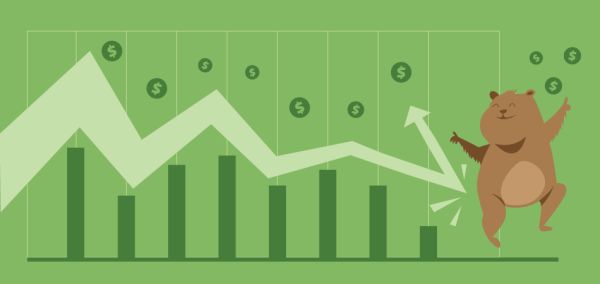
With high inflation, rising interest rates and ongoing conflicts in Europe, many are wondering if they will witness a recession in 2022. And what does it mean for the stock market if there is a recession? Are there any stocks that sell well during a recession?
The U.S. stock indices are the S&P 500(US500) and the Dow Jones Industrial Average(DJ).IA; $30) are down more than 10% over the past month. Both indices are widely used to measure U.S. stock market performance.
The S&P accounts for about 80% of the available market capitalization of the U.S. stock market and the top 500 companies, and DJ is equivalent.IA is a price-weighted measure of 30 U.S. blue-chip companies in all industries except transportation and utilities.
Which stocks are recession-ready?
An anti-crisis stock is a term used to describe an asset, company, industry or other entity that is considered economically resilient to the effects of a recession. Anti-recession stocks are added to your investment portfolio to protect you from a recessionary period that could be the beginning of a recession. Securities considered recession proof often have negative beta values (e.g., gold), which will indicate an inverse relationship to the broader market.
Understand that stocks are preparing for a recession.
A recession is a serious economic uncertainty that can have a major impact on the market. During a depression, the economy experiences a slowdown, which leads to extreme market volatility. Strictly speaking, no business can be 100% affected by a recession. Although negative investor sentiment characterizes this phase of the economic cycle, there are a few businesses that can provide stocks in case of a recession.
But adding these stocks to your portfolio may be more useful before the economy goes into recession; if so! But brother, trust me, we’re not here to give you stock advice. The stocks we will discuss today are here to help you understand the concept.
These businesses are called crisis businesses because they do relatively well during a depression.
These businesses can be classified as one because they have historically performed differently than other businesses during the recession. However, these stocks may belong to companies in other sectors.
Prevent common portfolio problems.
There are several factors you can use to protect your overall portfolio from a recession, including asset diversification, rebalancing and long investment schedules. Increasing your portfolio’s cash reserves is also a good way to protect against recession through the opportunity cost of losing income. It allows investors to quickly access liquidity to take advantage of the stock market downturn. Cash benefits from deflation in a recession because each dollar’s purchasing power increases. U.S. Treasury bonds are considered recession proof because they are backed by the governments of the largest economies in the world
Other options for investors.
In the Indian context, there are other categories of stocks that can thrive in a recession, but in these cases there are many caveats. Investors should be very careful with these stocks.
PSU stocks could benefit from increased government spending during a depression. This is because governments increase spending on infrastructure and social projects during recessions. This spending is sometimes passed through the PSU.
The defense sector was also relatively unaffected by the recession. This is because the government rarely cuts annual defense spending. However, if the government expects a significant reduction in tax revenues, a recession could affect the annual growth rate of the defense budget.
Determine the reserves for a recession.
This is not an exact science, and there is no definitive list of recessions. We can identify industries that have historically prospered during a recession, but it depends mostly on the economic conditions associated with the recession.
In addition to identifying industries that are in deep recession, there are additional factors to consider, such as changes in consumer behavior.
In 2008, the S&P 500 Index fell 37%. This is the worst annual total since the Great Depression of 1931. Still, the year had a bad impact on the stock market as a whole, but not all stocks fell. In fact, if you look specifically at the S&P 500 Index, a handful of companies recorded gains that did not match the economic boom.
Nevertheless, some companies that have recorded positive results are confident. Among the top 10 companies in the S&P 500 that year were Dollar Tree, Wal-Mart and Ross Stores, which had incredible annual returns of 60.8%, 20% and 17.6%, respectively.
Stocks to buy in a recession.
U.S. bank Wells Fargo favored U.S. stocks over international stocks for the remainder of 2022 and 2023 because the latter expected “revenue growth prospects in developed and emerging markets to lag the United States.
Wells Fargo’s preference for the U.S. stock market was supported by positive sentiment, geopolitical aspects and a strong U.S. dollar.
The bank believes the information technology (IT), energy and health care sectors “can partially offset short-term headwinds while maintaining positions that at least benefit from positive structural factors, which it believes will provide opportunities in the coming years.”
“We continue to favor the IT sector because of its high-quality characteristics and the prospect of further long-term integration of technology into the economy,” Fargo Wells said.”
The bank expects rising oil prices and supply constraints to continue for some time, so it favors the energy sector, especially integrated oil and gas companies with a strong capital base and a positive dependence on commodity price levels.
Wells Fargo favors a “manageable sub-sector in the health care sector as pandemics and political risks have diminished and the group has received sustained long-term growth momentum (demographics and industry integration).”
In addition, the bank added the food and equities sector to its list of preferred sub-industries because it expects the group to benefit from increasingly value-conscious consumers.



GIPHY App Key not set. Please check settings